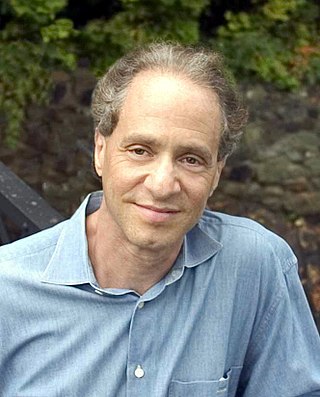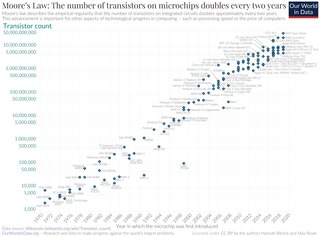Ilkka Tuomi | |
|---|---|
 | |
| Born | 26 September 1958 |
| Nationality | Finnish |
Ilkka Tuomi (born 26 September 1958) is a Finnish computer scientist, noted for writings on the subject of the Internet.
Ilkka Tuomi | |
|---|---|
 | |
| Born | 26 September 1958 |
| Nationality | Finnish |
Ilkka Tuomi (born 26 September 1958) is a Finnish computer scientist, noted for writings on the subject of the Internet.
Ilkka Tuomi has written books, including Networks of Innovation: Change and Meaning in the Age of the Internet [1] which develops theory of open innovation based on analysis of Internet-related innovations and open source, and Corporate Knowledge: Theory and Practice of Intelligent Organizations, [2] which develops theory of knowledge management.
Tuomi has written several articles in First Monday , an important peer reviewed journal on the Internet. The most famous of Tuomi's articles is probably The Lives and Death of Moore's Law , in which Tuomi states that Moore's law is an expression of technological determinism, used sloppily, and to a large extent not properly founded in empirical studies. This article has an associated response from Ray Kurzweil at: Exponential Growth:-An Illusion (Response to Ilkka Tuomi) and a comment on the response at: Response to Kurzweil.
Ilkka Tuomi was a staff member of the Institute for Prospective Technological Studies. He has also been a Principal Scientist at the Nokia Research Center. He is Chief Scientist at Oy Meaning Processing Ltd., an independent research institute located in Finland.

Raymond Kurzweil is an American computer scientist, author, inventor, and futurist. He is involved in fields such as optical character recognition (OCR), text-to-speech synthesis, speech recognition technology, and electronic keyboard instruments. He has written books on health, artificial intelligence (AI), transhumanism, the technological singularity, and futurism. Kurzweil is a public advocate for the futurist and transhumanist movements and gives public talks to share his optimistic outlook on life extension technologies and the future of nanotechnology, robotics, and biotechnology.

Moore's law is the observation that the number of transistors in an integrated circuit (IC) doubles about every two years. Moore's law is an observation and projection of a historical trend. Rather than a law of physics, it is an empirical relationship linked to gains from experience in production.
The technological singularity—or simply the singularity—is a hypothetical future point in time at which technological growth becomes uncontrollable and irreversible, resulting in unforeseeable changes to human civilization. According to the most popular version of the singularity hypothesis, I. J. Good's intelligence explosion model, an upgradable intelligent agent will eventually enter a "runaway reaction" of self-improvement cycles, each new and more intelligent generation appearing more and more rapidly, causing an "explosion" in intelligence and resulting in a powerful superintelligence that qualitatively far surpasses all human intelligence.

Innovation is the practical implementation of ideas that result in the introduction of new goods or services or improvement in offering goods or services. ISO TC 279 in the standard ISO 56000:2020 defines innovation as "a new or changed entity realizing or redistributing value". Others have different definitions; a common element in the definitions is a focus on newness, improvement, and spread of ideas or technologies.
An information society is a society where the usage, creation, distribution, manipulation and integration of information is a significant activity. Its main drivers are information and communication technologies, which have resulted in rapid growth of a variety of forms of information. Proponents of this theory posit that these technologies are impacting most important forms of social organization, including education, economy, health, government, warfare, and levels of democracy. The people who are able to partake in this form of society are sometimes called either computer users or even digital citizens, defined by K. Mossberger as “Those who use the Internet regularly and effectively”. This is one of many dozen internet terms that have been identified to suggest that humans are entering a new and different phase of society.
The following outline is provided as an overview of and topical guide to software engineering:

Singularitarianism is a movement defined by the belief that a technological singularity—the creation of superintelligence—will likely happen in the medium future, and that deliberate action ought to be taken to ensure that the singularity benefits humans.

The Age of Intelligent Machines is a non-fiction book about artificial intelligence by inventor and futurist Ray Kurzweil. This was his first book and the Association of American Publishers named it the Most Outstanding Computer Science Book of 1990. It was reviewed in The New York Times and The Christian Science Monitor. The format is a combination of monograph and anthology with contributed essays by artificial intelligence experts such as Daniel Dennett, Douglas Hofstadter, and Marvin Minsky.
In futures studies and the history of technology, accelerating change is the observed exponential nature of the rate of technological change in recent history, which may suggest faster and more profound change in the future and may or may not be accompanied by equally profound social and cultural change.
Theories of technological change and innovation attempt to explain the factors that shape technological innovation as well as the impact of technology on society and culture. Some of the most contemporary theories of technological change reject two of the previous views: the linear model of technological innovation and other, the technological determinism. To challenge the linear model, some of today's theories of technological change and innovation point to the history of technology, where they find evidence that technological innovation often gives rise to new scientific fields, and emphasizes the important role that social networks and cultural values play in creating and shaping technological artifacts. To challenge the so-called "technological determinism", today's theories of technological change emphasize the scope of the need of technical choice, which they find to be greater than most laypeople can realize; as scientists in philosophy of science, and further science and technology often like to say about this "It could have been different." For this reason, theorists who take these positions often argue that a greater public involvement in technological decision-making is desired.
Social peer-to-peer processes are interactions with a peer-to-peer dynamic. These peers can be humans or computers. Peer-to-peer (P2P) is a term that originated from the popular concept of the P2P distributed computer application architecture which partitions tasks or workloads between peers. This application structure was popularized by file sharing systems like Napster, the first of its kind in the late 1990s.
User innovation refers to innovation by intermediate users or consumer users, rather than by suppliers. This is a concept closely aligned to co-design and co-creation, and has been proven to result in more innovative solutions than traditional consultation methodologies.

Emerging technologies are technologies whose development, practical applications, or both are still largely unrealized. These technologies are generally new but also include older technologies finding new applications. Emerging technologies are often perceived as capable of changing the status quo.
Production is the process of combining various inputs, both material and immaterial in order to create output. Ideally this output will be a good or service which has value and contributes to the utility of individuals. The area of economics that focuses on production is called production theory, and it is closely related to the consumption theory of economics.
Innovation management is a combination of the management of innovation processes, and change management. It refers to product, business process, marketing and organizational innovation. Innovation management is the subject of ISO 56000 series standards being developed by ISO TC 279.
Matti Makkonen was a Finnish engineer in the field of mobile communications. He was employed by Nokia Networks and the then Telecom Finland, as well as Finnet Oy. Makkonen played a leading role in creating the mobile communication unit of what is today TeliaSonera. In 2008, Makkonen was awarded The Economist Innovation Award in the computing and telecommunications category for his work on text messaging (SMS).
The Linear Model of Innovation was an early model designed to understand the relationship of science and technology that begins with basic research that flows into applied research, development and diffusion

Salzburg Research Forschungsgesellschaft mbH is an independent research and technology organisation (RTO), located in Salzburg, Austria. The organisation specializes in applied research and development in the field of information and communications technologies (ICT).

How to Create a Mind: The Secret of Human Thought Revealed is a non-fiction book about brains, both human and artificial, by the inventor and futurist Ray Kurzweil. First published in hardcover on November 13, 2012 by Viking Press it became a New York Times Best Seller. It has received attention from The Washington Post, The New York Times and The New Yorker.
Democratization of technology refers to the process by which access to technology rapidly continues to become more accessible to more people. New technologies and improved user experiences have empowered those outside of the technical industry to access and use technological products and services. At an increasing scale, consumers have greater access to use and purchase technologically sophisticated products, as well as to participate meaningfully in the development of these products. Industry innovation and user demand have been associated with more affordable, user-friendly products. This is an ongoing process, beginning with the development of mass production and increasing dramatically as digitization became commonplace.
Ilkka Tuomi key papers at First Monday: